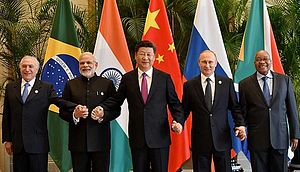The Eurasia Society sponsored the “Doing Business with the BRICS” Conference in Washington, D.C. on May 15 at Africa House, the African Union’s Representational Mission to the United States. Diplomatic representatives of four of the five BRICS nations, including key stakeholders and partners in the economic development of developing countries, including the Asian Development Bank, the World Bank, and a variety of legal, business, and risk management specialists, all had places at the speakers’ table.
Of the BRICS nations, only China did not make a presentation to the audience of well over 100 gathered specialists. Indeed, one of the more intriguing questions that came out of the conference was, “Where was China?”
“BRICS” stands for Brazil, Russia, India, China, and South Africa, the five major nations that are identified – and identify themselves – as major emerging, fast, and high growth economies, destined to dominate a larger share of the global economy in the coming decades of the 21st century.
The BRICS concept was originally coined as “BRIC” in a paper written in 2001 for Goldman Sachs by Jim O’Neill (later made Baron O’Neill of Gatley), a British economist.
Several years later, O’Neill’s idea began to take concrete shape in a meeting held between the then-leaders of China, Russia, and India on the fringes of a G-8 outreach summit in St. Petersburg, Russia.
By 2009, with Brazil added into the mix, the first BRIC Summit was held in Yekaterinburg, Russia. In 2011, South Africa joined the grouping, and BRIC became “BRICS.”
By 2014, BRICS had institutionalized itself. The establishment of the New Development Bank, headquartered in Shanghai, gave voice, money, and purpose to the BRICS concept. Each of the five BRICS nations contributed equal shares of the initially subscribed $50 billion in capital. Each country has an equal voice in the bank’s governance.
The Eurasia Society conference in Washington featured presentations from a number of official representatives from both the BRICS countries and multilateral institutions. Chinese Embassy officials were in the audience, but none of their representatives took to the stage to tout their own economic opportunities, unlike all of the other four BRICS nations. Why?
This was a lost opportunity for China. The level of representation from the rest of the BRICS group was substantial – those from the embassies held the position of minister of their economic sections — and it cannot have been lost on them that China chose to disassociate itself from the conference except as a passive observer. China’s backseat presence is all the more interesting given the atmosphere of the U.S.-China trade war, which ostensibly drives it to expand its economic relationships in and with other parts of the world.
China does billions of dollars of business with the other four BRICS nations, as well as with the developing world in general. Much of that business falls under its Belt and Road Initiative (BRI) umbrella, the ambitious investment and infrastructure-building global plan laid out by Chinese President Xi Jinping six years ago. BRI projects and China’s financing agreements in debt-laden poor nations have drawn scrutiny and criticism, but at this conference in Washington last week, China was in an ostensibly friendly space, albeit among rivals such as India. China is the dominant economy of the BRICS nations, it hosts the BRICS bank (as the New Development Bank is now commonly called), and it seems to be looking for forums to show its strength and resolve in the face of the U.S.-China trade war.
One wonders if, in the end, China’s silence at this small but important gathering was indeed a defensive measure. And if so, against what is it defending?

































